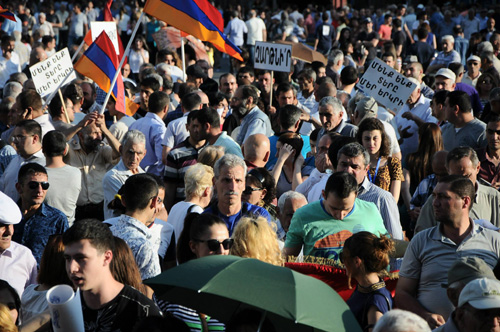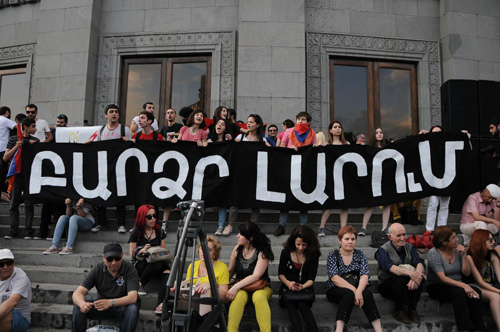BEVERLY HILLS — From a star-studded gala banquet to an All-Star Judge’s legal education panel and much more, members and guests of the Armenian Bar Association’s 26th Annual Meeting at the luxurious Montage Hotel in Beverly Hills, California were treated to a weekend that they won’t soon forget.
On Saturday morning, following the Association’s business meeting, attendees heard an outstanding educational program featuring four distinguished federal jurists focusing on effective litigation practice in Federal courts. The panel consisted of U.S. District Court Judges Andre Birotte, Jr., Larry Burns and Dickran Tevrizian (ret.) and U.S. District Court Magistrate Judge Jacqueline Chooljian. The panel was moderated by Los Angeles Superior Court Judge Zaven Sinanian. “What a privilege and honor it is to have panelists with the depth and quality of knowledge that we saw today. We are pleased to deliver unrivaled continuing legal education to our members,†said Armenian Bar Association Chairman, Armen Hovannisian in an interview following the lecture.
The morning lecture was followed by a luncheon, where the keynote speaker was Los Angeles Superior Court Judge Lance Ito (ret.). Most famous for presiding over the “trial of the century†(People vs. O.J. Simpson), Judge Ito drew several ovations from the audience as he shared highlights of his recent trip to the Republic of Armenia and Western Armenia. To the delight of the audience, Judge Ito gave the audience a pictorial and historical glimpse of Armenia and provided realistic and practical means to garner support for universal recognition of the Armenian Genocide. “His slide show presentation of his journeys to both sides of the land of Ararat, and his detailed knowledge of Armenian history and culture, shows that deep inside the soul of Judge Ito is the Armenian spirit. It was a thrilling presentation,†said Armenian Bar Association Board member, Vanna Kitsinian.
The luncheon also featured a special presentation devoted to thanking Pope Francis for his strength in recognizing the Armenian Genocide as the spiritual leader of the one billion member Catholic Church. Accepting the Association’s gratitude on behalf of the Armenian Catholic Church was Father Thomas Garabedian, a Ph.D. in Canon Law, who provided the audience with an informative presentation about the great significance of the Pope’s act of recognition. Father Thomas also provided a spiritually uplifting blessing during the luncheon.
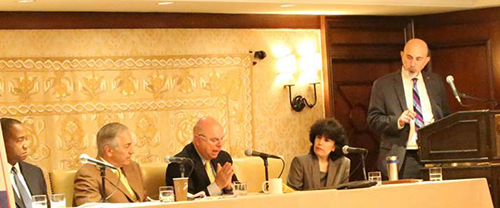
Left to right U.S. District Court Judges Andre Birotte, Jr., Larry Burns, Dickran Tevrizian (ret.), U.S. District Court Magistrate Judge Jacqueline Chooljian and Los Angeles Superior Court Judge Zaven Sinanian
The second panel on restorative justice included international law advocates Steve Dadaian, Karnig Kerkonian, and Seepan Parseghian. Moderated by board member Edvin Minassian, the presentation featured Steve Dadaian’s discussion about the various treaties that may have implications on Armenian reparation claims, such as the Treaties of Sevres, Kars, and Lausanne, and the arbitral award of President Woodrow Wilson. There was also a fascinating comparative analysis of the origins of the Zionist Movement, Theodor Herzl and the lessons that can be drawn from the Jewish experience of re-establishing statehood. Karnig Kerkonian further gave an eye-opening perspective on how the legal theory of Res Judicata can have an important implication on Armenian claims if the Armenian diaspora does not formulate a demand of that which it seeks to obtain as reparations. Seepan Parseghian presented the audience with an innovative means of seeking restorative justice through the Indigenous Peoples Act. The presentations sparked such an intense interest among the audience members that a lively and constructive 45 minute question and answer session followed.
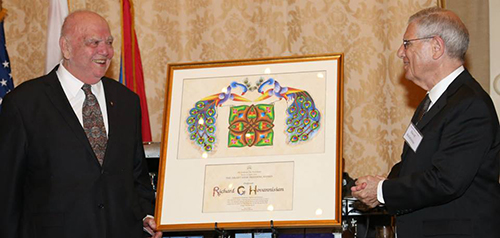
Prof Hovannisian receiving Hrant Dink Freedom award by the Association’s first Chairman, David Balabanian
The highlight of the weekend was the Gala Silver Anniversary Banquet which took place in the grand Marquesa ballroom of the Montage Hotel. Masters of Ceremony Vanna Kitsinian and Gerard Kassabian presented three of the Armenian Bar Association’s highest honors. The first recipient was world renowned Armenian historian and scholar, Prof. Richard Hovannisian. Dr. Hovannisian was presented with the Association’s highest honor, The Hrant Dink Freedom Award, presented to only an exceptional few individuals who have demonstrated the ability to speak truth to power on issues of great magnitude to the Armenian community. Armenian Bar Association Chairman, Armen Hovannisian was recognized for his outstanding leadership of the organization.
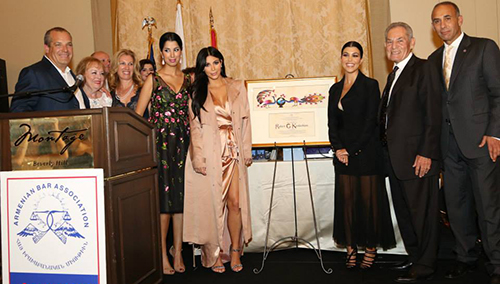
Kim and Kourtney Kardashian flanked by Tina Odjaghian, uncle Tommy Kardashian, Armen Hovannisian and members of the Kardashian family.
Following the chairman’s presentation, two of the most popular women in the world Kim and Kourtney Kardashian joined their aunt and uncle to accept the Armenian Bar Association’s Family Heritage Award given in honor of their late father, Robert Kardashian. Kim Kardashian addressed the audience stating that she and her sisters were very proud of their Armenian heritage and commenting on the importance in seeking recognition of the Armenian Genocide.
The presentation of the Family Heritage Award was followed by a special award recognizing Chairman Ex-Officio, Garo Ghazarian, for his lifetime community service.

From left to right Saro Kerkonian, Karnig Kerkonian, Armen Hovannisian, Harry Dikranian, Gary Moomjian and Edvin Minassian
Former Chairs of the Armenian Bar Association who were in attendance received a pin for their service to the Association which was presented by the founder of the organization, Raffi Hovannisian. The evening’s festivities began with blessings from Archbishops Moushegh Mardirossian and Hovnan Derderian.
On Friday evening, attendees gathered for an outdoor reception under the stars at the famous Via Arollo restaurant in Beverly Hills, where they networked while enjoying delicious wines and scrumptious appetizers.
Elections were held at the meeting. Karnig Kerkonian, of Chicago, Scott Ohnegian of New Jersey and California attorneys Ara Babaian, Saro Kerkonian and Tina Odjaghian were elected to three-year terms as Directors-at-Large to the Board of Governors.
The newly assembled Board then elected Harry Dikranian, of Montreal, Canada, as Chair, Saro Kerkonian, Gary Moomjian of New York and Kathy Ossian of Michigan, as Vice Chairs, Vanna Kitsinian of California as Secretary and Gerard Kassabian, also of California, as Treasurer.
“Our organizing committee put in countless hours to assemble an Annual Meeting of the highest caliber for our members and community. We are proud to have delivered a memorable array of events and activities which enlightened our members, recognized those who have given it all for their professions and the Armenian Cause and an opportunity for those who attended to enjoy professional networking in beautiful Beverly Hills, California. We look forward to building on this momentum in the coming year,†said Harry Dikranian, newly elected Chairman of the Armenian Bar Association.
Armenian Bar Association Annual Meeting and Banquet




